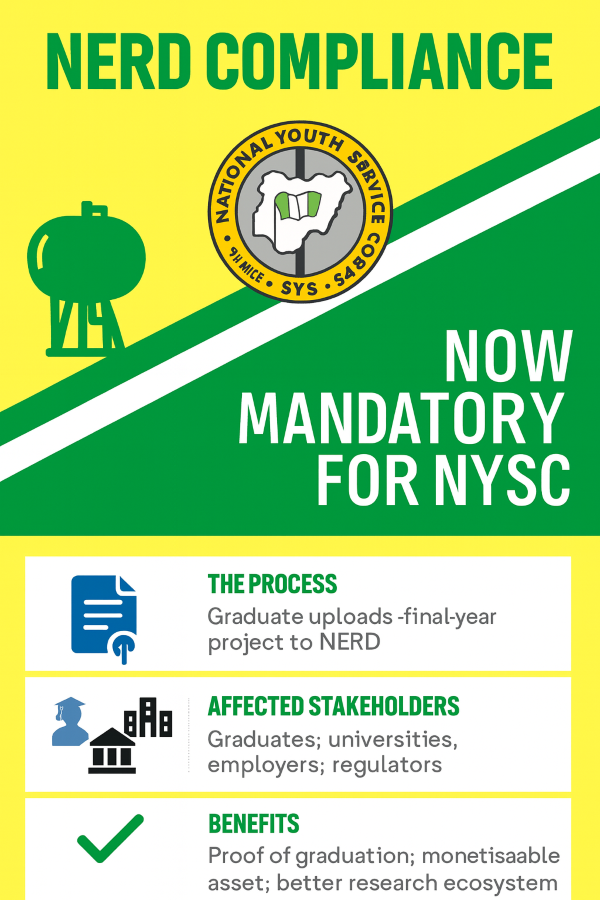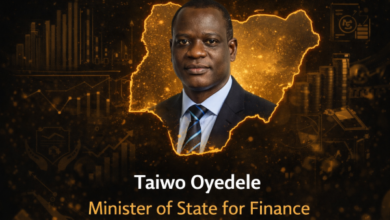Tinubu Makes NERD Compliance Mandatory for NYSC Mobilisation: A New Era for Nigeria’s Education and Accountability

Is This The End of ‘Business-as-Usual’ in Academic Validation?
In a sweeping policy reform aimed at restoring credibility to Nigeria’s academic system, President Bola Ahmed Tinubu has made compliance with the National Education Repository and Databank (NERD) a mandatory condition for National Youth Service Corps (NYSC) mobilisation and exemption. Effective October 6, 2025, no graduate from any Nigerian or foreign institution will be eligible for NYSC without proof of NERD compliance.
The directive, conveyed by the Secretary to the Government of the Federation (SGF) Senator George Akume, represents one of the boldest steps yet to confront academic fraud, certificate racketeering, and poor quality assurance that have plagued Nigeria’s education system for decades.
At its core, the NERD policy requires all Nigerian graduates to deposit their academic outputs — thesis, dissertations, project reports, and final-year works — into a centralised digital repository. This ensures independent proof of academic engagement, timestamps scholarly activity, and builds a national archive of Nigeria’s intellectual assets.
Background: Why NERD Matters Now
For years, concerns have mounted about certificate forgery, substandard supervision, and erosion of academic integrity across Nigerian institutions. Employers, government agencies, and even foreign embassies have expressed doubts about the credibility of Nigerian academic qualifications.
The NERD initiative, formally activated in March 2025 by Education Minister Dr. Tunji Alausa, seeks to end this. By mandating a digital footprint for every academic output, Nigeria joins global peers like India, South Africa, and the UK, who already run open-access educational databanks.
The New Rules for NYSC Mobilisation
- Effective October 6, 2025: No mobilisation or exemption from NYSC without proof of NERD compliance.
- Who is covered? All graduates of universities, polytechnics, colleges of education, nursing schools, and even foreign-trained Nigerians.
- What must be uploaded? Final-year projects, theses, dissertations, or research works.
- What about serving Corps members? The directive does not affect those already mobilised before the enforcement date.
Stakeholder Implications
1. Students and Graduates
For the first time, academic work becomes both a requirement and a potential asset. Every student’s project will now be digitally archived, carrying not just their name but also those of their supervisors, Heads of Department, and institutions.
Implication: Students gain protection against academic theft while also being incentivised to produce higher-quality work, knowing it will be globally visible.
2. Lecturers and Institutions
NERD introduces accountability by visibility. Supervisors’ names will appear alongside their students’ projects, creating pressure to uphold quality standards. Lazy supervision will no longer be hidden.
Implication: Institutions that previously cut corners will now face reputational consequences if their submissions reflect poor academic rigour.
3. The Labour Market and Employers
Employers stand to benefit most. With NERD, verifying whether a graduate truly completed a programme or authored a project becomes effortless. Fake CVs and forged certificates will be easier to detect.
Implication: Employers will now have access to a verifiable database, raising confidence in Nigerian graduates both locally and abroad.
4. The Economy and National Development
NERD is more than academic record-keeping; it is an economic tool. By creating a central archive of research, Nigeria can better harness local innovation in science, technology, medicine, and social sciences.
Implication: Policymakers and industries can leverage the databank for evidence-based decisions, potentially reducing reliance on foreign research imports.
5. Monetisation and Reward System
In a landmark twist, Tinubu’s approval also covers a monetisation model that allows students and lecturers to earn lifetime royalties on their uploaded works. This transforms academic research from a mere graduation requirement into a potential source of long-term income.
Implication: A new knowledge economy emerges, rewarding intellectual output like never before in Nigeria’s history.
Sector Analysis
Education Sector
- Increased quality of supervision and accountability.
- Pressure on institutions to digitise processes.
- Potential resistance from poorly resourced schools that lack IT infrastructure.
Technology Sector
- Opportunities for edtech firms, data centres, and API service providers.
- NIMC and other data agencies mandated to integrate NERD with national identity systems.
Legal and Regulatory Sector
- NERD compliance will test Nigeria’s data protection framework (NDPR).
- Likely rise in legal disputes over plagiarism and academic authorship.
Economic Sector
- Improved global credibility of Nigerian certificates boosts employability.
- The databank could unlock homegrown innovations for industrial application.
Investor Implications
- EdTech Startups: Demand for software and integration services will surge.
- Publishing Industry: Digital rights management opportunities in licensing academic works.
- Private Universities: Could gain competitive advantage by early compliance and showcasing superior research quality.
- Investors in Human Capital: Nigeria’s reputation as an education exporter may improve, attracting diaspora and foreign collaborations.
BRANDECONOMY Takeaways for Decision-Makers
- For Policymakers: Ensure phased implementation so institutions with weak infrastructure are not left behind.
- For University Managements: Invest in repository technology and prepare academic staff for higher accountability.
- For Students: Recognise your project work is now part of Nigeria’s intellectual economy — treat it with seriousness.
- For Employers: Start building recruitment processes around NERD verification to ensure only credible graduates are employed.
- For Investors: Watch for edtech, research, and data monetisation opportunities. The NERD era may create entirely new industries.
Conclusion
President Tinubu’s directive linking NERD compliance to NYSC mobilisation is not just another policy reform; it is a historic attempt to restore academic credibility, fight fraud, and monetise intellectual capital in Nigeria.
If effectively implemented, it could be the single most important reform in Nigerian education since the establishment of the NYSC itself in 1973.











